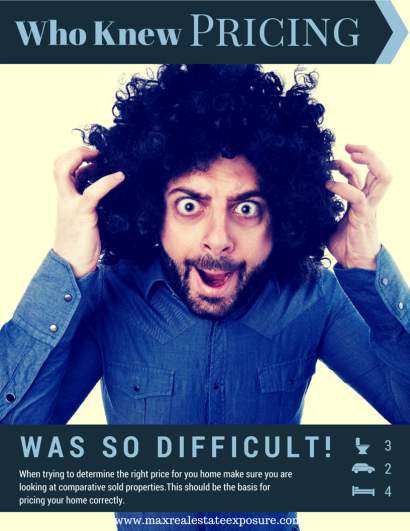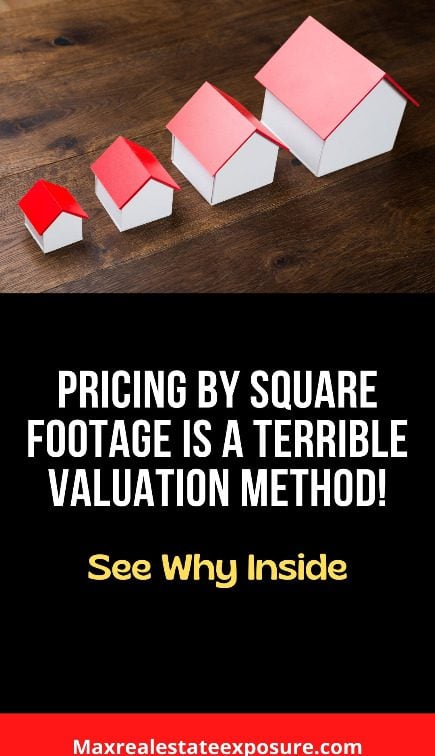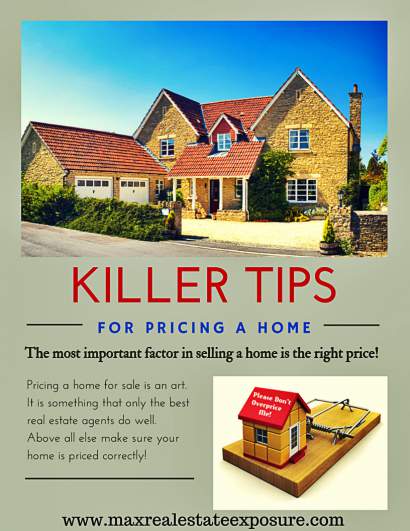 How to Price a House For Sale
How to Price a House For Sale
Pricing a house in a way that will encourage a timely sale is quite challenging for home sellers and often for Realtors.
House pricing isn’t rocket science, yet so many get it wrong.
Numerous studies indicate that the longer a home remains on the market, the less money it will fetch when it sells.
Finding yourself with a home that won’t sell because you priced it too high is the last thing you want to happen, which is why it is so important to price it correctly at the start.
Pricing a home correctly is vital in selling it quickly for the most money possible.
Understanding how to price a house accurately is critical for homeowners to have the most success.
Buyers Have All The Information on House Pricing
Remember, buyers have access to a lot of information about your home. With this information in hand, it is unlikely they will be taken in by a price above market value.
They will also be able to see how long the home has remained on the market, and they may be prone to avoid the home the longer it remains unsold.
The days of information only being available to real estate agents are long gone. Home buyers today are armed to the tooth with information.
An educated home buyer understands when they see a good deal as much as an unrealistic seller who has pipe dreams about what their property is worth.
Many sellers, unfortunately, are still under the impression that pricing a home higher leads to a higher sale price. Sorry guys, but this is NOT the case! Study after study indicates that homes priced correctly from day one get more money than those that have to reduce their price.
An excellent real estate agent understands a seller’s dilemma of not wanting to leave money on the table. This is why it is crucial to understand the factors to consider when pricing a house for sale right from day one.
Use these data points wisely, and you can price your home where it should be without worrying it could have fetched thousands more.
There are many things to know about pricing a home to sell. We will cover all of them.
Below are six considerations when pricing a house you should be familiar with.
6 Factors To Look At When Pricing a House
Let’s look at what you need to know on how to price a house for sale. It’s how Realtors determine how to price a home.
1. The Current Real Estate Market Conditions
What is the condition of the local real estate market? Is it currently a buyer’s or seller’s market or somewhere between?
If you are considering selling your home, you have probably been paying some attention to the real estate market in your area. Generally speaking, market conditions will play a role in pricing a house.
Are the prices of homes going up or down? Whichever way prices are headed, you will want to plan accordingly.
If you happen to be selling during a slowdown, you will need to price more competitively if you want to move the house. A buyer’s market means fewer buyers competing for your home.
You could always wait it out for things to improve, but if they don’t improve, you are left pricing your home even lower than you would have at the outset.
Conversely, house pricing could be headed upwards if it’s a seller’s market. You probably don’t want to leave money on the table.
Fortunately, when real estate markets favor sellers, the likelihood of a bidding war increases when pricing a house slightly under the market value.
2. Comparative Sold Properties Are The Most Vital Factor For Pricing a House
 The most essential factor to establishing pricing a house is the comparable sales or what real estate agents call “comps.”
The most essential factor to establishing pricing a house is the comparable sales or what real estate agents call “comps.”
Looking at recently sold properties in your area similar to yours is one of the primary ways to price a home.
This is the number one means of how a real estate agent figures out market value. The search area you choose will usually be based on the population density of your area.
If your home is in a densely populated city, you may only search within a mile of your home’s location for recently sold homes.
If you live in the countryside, you may have to search for a radius of several miles.
Make no mistake about it; what similar homes are selling for in your area is the most crucial factor in determining the market value of any property.
3. The Under Agreement Dates of Sold Properties Factor Into Pricing a House
A home’s selling price is much more relevant to your sales situation if the market was similar at the time it was sold.
This is a pricing factor that is often overlooked by both homeowners and real estate agents alike. You need to look at the date the offer was made on the comparable properties and determine if that sale occurred in a similar market or if there were differences.
If the market was more competitive at the time the similar home sold as it is now, you might not be able to price as high and still get a good response.
For example, if the house sold in the spring and you’re now trying to sell at the summer’s end, the market activity could be much different.
On the other hand, if the market was more competitive, with numerous similar homes for sale, you may be able to ask for more money now.
This is particularly true in real estate markets where inventory is meager. Understanding the difference in markets during different periods is one area where having a Realtor who knows the local market inside and out helps.
4. Homes Under Agreement Can Assist With Home Pricing
Homes currently under contract are essential when pricing a home for sale because it gives you a snapshot of what is  occurring in the market.
occurring in the market.
The only problem with looking at inventory under contract is we don’t know what the property sold for until it closes.
It is against the code of ethics for a Realtor to reveal the sale price of a home without the seller’s express permission to do so.
You can, however, make an educated guess based on how quickly the house went under contract.
If it went very fast, the chances are greater that the home is under contract for close to, if not the asking price.
If it is a seller’s market, there could be a strong chance the property sold over the asking price.
Pending sales should never be overlooked when pricing a house for sale.
It is essential to point out that pending vs. contingent is different. There is a greater chance the sale could fall through when it is contingent.
5. Current Inventory Factors In Pricing a Home For Sale
You want to look at the current home inventory in your area to get a feel for how competitive the market is at the moment.
If there is a massive glut of houses right now that are similar to yours, you are in a competitive market and will need to price more aggressively to stand out.
If fewer homes are available for sale, you may be able to price a little higher because so many people are looking to buy. Remember, you want your home to stand out from the other available homes.
Comparative Houses For Sale is The Least Essential Factor in Pricing
Comparative active properties are the least important factor in pricing a house to sell. You certainly want to analyze all the properties you’re competing against, but no more.
The homes currently for sale have already gone through the same process you are going through, and the prices they sit at can give you an idea of how to price yours competitively.
Many owners are tempted to price just a little higher than the competition, imagining that their homes are unique and will fetch a higher price.
Most often, this is not the case. Pricing higher than comparable homes usually leads to the house sitting and not selling, which leads to the home becoming less valuable in the eyes of the buying public.
Your Neighbor’s House Price Means Little
It cannot be emphasized enough that what other homeowners think their home is worth is the least important factor in determining the market value of YOUR home.
In other words, you don’t want to hang your hat on your neighbor’s inflated view of their property. Doing so can stop a sale.
Additionally, the price of your neighbor’s home can drop at a moment’s notice. If you craft your pricing based on your neighbors, where will that leave you once they reduce the price? You are correct if you think you will need to adjust as well.
The problem is you already made a considerable mistake basing your price on something that has not sold. Market value is always determined by what has SOLD, not what’s for sale.
The price of a home currently listed for sale is the least important factor in establishing market value.
A homeowner looking at what their neighbor’s property is listed at is often a reason given for pricing a home in a particular manner. This is one of many lame reasons sellers give for overpricing their homes. Don’t be one of them!
6. Look at Expired and Withdrawn Properties For Additional Pricing Guidance
Expired listings and withdrawn properties have something in common. They didn’t sell. When looking at these homes, one common denominator is that they were priced too high.
Looking at these listing property statuses in the multiple listing service can give further insights into pricing correctly.
It can help avoid pricing mistakes others have already made.
How Mistakes Are Made in Pricing a Home
Many mistakes are consistently made with house pricing by using inaccurate methods. Pricing a house too high is commonplace when looking at data points that do not correlate with market value.
Using Zillow For House Pricing
 One of the banes of many professional real estate agents is house pricing based on looking at Zillow. Looking at an inaccurate Zillow estimate of value is commonplace.
One of the banes of many professional real estate agents is house pricing based on looking at Zillow. Looking at an inaccurate Zillow estimate of value is commonplace.
It is funny how some homeowners will look at a database projecting the worth of millions of homes around the country and somehow put stock in this being the actual value of their home.
Of course, this rarely happens when Zillow says the house is worth $50,000 less than the actual value. This is when a seller proudly proclaims Zillow is out of their mind.
Turn it the other way around, and some sellers will think a Zillow is a supercomputer similar to the ones NASA uses to track lunar vehicles. Sometimes sellers see and believe what they want to, even when it is too good to be true.
A Zillow estimate is NOT a factor in pricing your home for sale.
Using Assessed Values For Pricing a House
The town or city you reside in will have an assessed value of your property. This value is how they figure out their tax structure.
Assessed values, however, are nothing more than a measuring stick to collect an appropriate amount of taxes from those that reside in the community.
In other words, how much does the town need to operate correctly? The official nature of this may encourage you to rely on the assessed value of your home for pricing purposes, which is almost always a big mistake.
Assessed values almost always do not correlate with current market value. One of the most significant problems with the assessed value is that it is often not current.
Municipalities will usually assess value once every 1-3 years. The market can change substantially in six months, much less a year. Even some not-so-skilled real estate agents will fall for this one.
Never look at tax assessments for house pricing.
Refinance Appraisals Should Not Be Used For House Pricing
A refinance appraisal is another means of valuation that many sellers like to hang their hat on, primarily when it benefits them.
The only problem is that it might be meaningless if this re-finance appraisal wasn’t very recent. More importantly, refinance appraisals can be tricky, especially when they are done with getting a new mortgage.
The dirty little secret here is that those giving you the loan want the appraisal to work – within reason, of course. Banks and mortgage companies make money by writing loans.
When you refinance your property, the lender puts more money in their pocket. There is a bit more leeway regarding valuations on a refinance. Most of the time, your appraisal will not be conservative unless the real estate market has been dropping steadily.
In other words, a re-finance appraisal can be generous regarding the market value.
Listening to an Unscrupulous or Unskilled Agent Causes Problems in Pricing a Home to Sell
Getting bad advice from a real estate agent on house pricing happens far too frequently.
We all want to believe our home is better than the next guy who sold down the street. We often mentally calculate the reasons why, even though they might not be valid reasons at all.
Some real estate agents will do anything they can to land a listing. If they know you are interviewing multiple Realtors, the chances will go up that inflating the value of your home could happen.
In real estate circles, this is called “buying a listing.”
Agents that don’t have much business or are not skilled at landing a listing otherwise will tell a seller what they want to hear in hopes of getting the business. Real Estate agents that mislead on market value are not that uncommon.
It doesn’t take a genius to see how many listings get reduced daily to know some Tom Foolery is going on.
These are just a few of the ways real estate gets priced incorrectly. You can see a few more by reading the article referenced. This is NOT how to price your home accurately!
Pricing a House Using Price Per Square Foot
 One of the least accurate ways of pricing a home to sell is the price per square foot. Some real estate agents will use this simplistic valuation form to determine home values.
One of the least accurate ways of pricing a home to sell is the price per square foot. Some real estate agents will use this simplistic valuation form to determine home values.
The size of a home is only one variable. Many other factors influence pricing.
The location, bedroom and bathroom counts, condition, amenities, neighborhood, and lot all play significant roles.
Trying to price a home using price per square foot will lead to overpricing or underpricing.
A Realtor or real estate appraiser wouldn’t be necessary if the price per square foot were accurate.
Get a Real Estate Appraisal When Not Using a Real Estate Agent
Get a real estate appraisal if you sell your home without a Realtor. You may be asking yourself how much you can sell your house for. Don’t guess!
Invest in getting it appraised by a professional. A professional appraiser will determine your home value like a real estate agent.
Pricing your home for sale should be accurate when an excellent local appraiser is used.
House pricing isn’t a guessing game or a fishing expedition.
How to Price a Home to Sell?
The key to pricing a home correctly is listening to a seasoned real estate with a track record of success. You have probably seen sold signs consistently in your city or town from the same individuals.
These real estate agents know what they’re doing. The best Realtors will prepare a comparative market analysis to evaluate your home. They will have a home pricing strategy based on facts, not something unattainable.
The comparable sales data presented will be comparable. The only thing that will determine home value is accurate data.
Understanding how to price a house for sale means listening to the data. A lousy house pricing strategy is to avoid looking at the facts.
An accurate comparative analysis will pinpoint an accurate list price and probable sale price.
Using emotion to guide your decisions will lead to pricing a house too high. It’s worth repeating the price of a home is the most critical variable in a fast house sale.
Avoid Thinking All Your Improvements Increased Your Home Value
One of the most common mistakes in pricing a home to sell is thinking all your home improvements increased the value. Unfortunately, they didn’t.
Many improvements can be worthwhile, some even necessary. That doesn’t mean they increased the home’s value based on the cost.
For example, did you have to replace your septic system, which cost $30,000? That doesn’t mean you can add $30,000 or more to your home’s asking price, far from it.
You would be lucky to get a bump in the value of $5000. From experience, far too many sellers think their improvements translate into a 100 percent or more return. Even replacing a roof doesn’t offer a significant return on investment.
Understanding what improvements add value and which don’t is crucial in pricing a home.
Keep The Emotion Out of Pricing a Home
Houses don’t turn into homes until precious memories are made. Unfortunately, all the good times can lead us to believe our properties are better than the neighbor’s.
Pricing a house too high often happens when our better judgment gets in the way. Realtors determining how to price a home don’t have those emotions.
Pricing a home is based on facts, not on feel-good emotions. It is essential to treat your home sale like a business decision.
Understand When to Price on the “9s”.
You have probably noticed many real estate agents love to price houses using nines. For example, instead of listing a house at $530,000, it will be $529,900.
Real Estate agents price a home this way because of the supposed psychological benefits. Do buyers believe they are paying a lot less? Probably not. But for some reason, real estate agents do.
House pricing this way can be detrimental in some circumstances. Buyers usually search in $50,000 increments when visiting their favorite websites to view real estate listings. Some may search in one hundred thousand increments.
Here is how pricing on the 9’s doesn’t make sense in some circumstances. If a buyer is looking between $550,000 and $650,000, they will not see a house priced at $549,900.
Using this home pricing strategy at specific pricing milestones does not make sense.
It wouldn’t make any difference for a home priced at $539,900 vs. $540,000 because this isn’t a significant price point.
House pricing to be found in the most searches makes the most sense.
Avoid Wierd Home Pricing
 Have you ever seen a home priced at some strange figure? For example, $567,891. There is no rhyme or reason for pricing a house in this fashion. It screams the real estate agent is a bozo.
Have you ever seen a home priced at some strange figure? For example, $567,891. There is no rhyme or reason for pricing a house in this fashion. It screams the real estate agent is a bozo.
Your goal should be pricing the house correctly, not some quirky strategy that brings attention to a real estate agent.
Painting your house a fluorescent shade would be lots of attention, but not in a good way. A pricing strategy like this is the same thing.
Adjusting House Pricing Accordingly
Pricing a house isn’t set and forget. Any proper house pricing strategy involves evaluating it.
You may look at all the information, price your home, put it on the market, and then get a lackluster response.
If your home sits for a month or more with few offers or no offers, you know you need to adjust your price quickly to avoid your home developing a negative reputation among buyers.
Even the best real estate agents will sometimes price a home too high, so don’t feel too bad about it.
Just be willing to adjust if you need to change. Knowing when to adjust your home’s asking price is vital in selling it. Too many sellers want to hold on to their high prices even when not attracting buyers.
Lower your price, let customers know, and see what happens. You will know when you have hit the sweet spot, as offers will start coming in that look promising.
Few things feel better than being buried in offers to buy your home. Use the above information to price your home competitively, and enjoy the easy selling process.
FAQs on House Pricing
1. How do you estimate the price of a home?
Pricing a home is based on careful research using comparable sales. Looking at sold, pending, and current properties allow you to formulate an accurate price.
2. Is it Better to Price Your Home High or Low?
Pricing a house lower is better than overpricing. A home priced under value will usually lead to multiple offers and a potential bidding war. Overpriced homes rarely sell.
3. What Factors Go Into Pricing a Home?
There are several things that appraisers and real estate agents look at when establishing market value. They include the home size, location, amenities, age, condition, bed & bath counts, and lot desirability.
4. How Do You Tell if a House Has a Good Price?
When a home is priced reasonably, there is usually high demand, and it sells quickly. If there are a significant amount of showings when listed for sale, it is a good sign the price is fair.
5. Is Zillow an Accurate Estimate of Home Value?
No. Never rely on Zillow for accurate house pricing.
Final Thoughts on Home Pricing
Accurate home pricing is an art and a science. Whether buying or selling, it is crucial to have a firm grasp on pricing. Without professional advice, it is easy to make mistakes.
Other Helpful Home Pricing Articles
- Real Estate pricing mistakes must be avoided via Rochester Real Estate Blog.
- Is your home priced like the game show The Price is Right? As Imagine Your House explains, don’t do it.
- How to sell your home for top dollar by pricing it correctly via Selling Warner Robbins.
Use these additional helpful articles on pricing a home appropriately to get your place priced as it should be.
Always remember that proper house pricing is the #1 factor in selling a home. This is something you control. Pricing your home accurately will put you in a position for a successful sale.
About the Author: The above Real Estate information on pricing a house was provided by Bill Gassett, a Nationally recognized leader in his field. Bill can be reached via email at billgassett@remaxexec.com or by phone at 508-625-0191. Bill has helped people move in and out of many Metrowest towns for the last 37+ Years.
Are you thinking of selling your home? I am passionate about real estate and love sharing my marketing expertise!
I service Real Estate sales in the following Metrowest MA towns: Ashland, Bellingham, Douglas, Framingham, Franklin, Grafton, Holliston, Hopkinton, Hopedale, Medway, Mendon, Milford, Millbury, Millville, Natick, Northborough, Northbridge, Shrewsbury, Southborough, Sutton, Wayland, Westborough, Whitinsville, Worcester, Upton and Uxbridge MA.



This is excellent advice, Bill. It’s not hard to understand, except that some sellers still don’t get it.
Thanks Gabe and you are right about so many sellers not understanding what is important and what isn’t when it comes to market value and pricing a home properly.
Great article! It will certainly give for sale by owners a general understanding of how to proceed on marketing their homes.
Unfortunately this is not completely true. In the 2016 market we are finding agents who have no idea of market value for homes. They are telling homeowners that they will not sell their home for over ASSESSED value. They under price the home for it to be sold fast. Many buyers will not get into a bidding war and many agents will tell the owner that the 1st offer is always the best. I am not alone in this opinion. I have spoken with many real estate agents who feel that some agents are in it for the money and not to help the seller get full market value. In today’s market being overpriced for a short time is not a bad thing.
Harold there will always be agents that don’t understand how to put a value on a home. It is one of the most difficult aspects of marketing homes properly. Pricing a home is a skill and an art that many agents do not possess. Rarely do I see an agent intentionally under price a home. In fact it is just the opposite – most agents will take an overpriced home just to get the listing and then badger the seller for price reductions. Being overpriced from day one is never a good idea. History shows us over and over again that homes priced correctly one day one sell for more than those that are not. Once you start reducing your price you are in a position of weakness.
How do you know when to lower your price? And should you value your home on the assessed price?
Marie – the assessed value of a home has very little to do with the market value. In fact, far more often than not there is no correlation. When to lower your asking price is a bit more subjective. If you have not received an offer in thirty to fourty five days that would be a decent benchmark.
Hi Bill,
After almost 20 years in real estate, 6 of those years spent at RE/MAX Executive, I still enjoy reading other Realtors posts. In particular, I liked reading your article on How to Sell a Luxury Home. I have a few luxury homes coming on the market in the next month and would like to find a National Luxury Homes Sales site for RE/MAX agents.